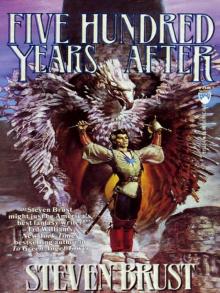- Home
- Steven Brust
Sethra Lavode (Viscount of Adrilankha) Page 23
Sethra Lavode (Viscount of Adrilankha) Read online
Page 23
The Warlock bowed and said, “General, for so I believe I ought to address you—”
The Enchantress shrugged, as if to say that any of a number of ways of addressing her were equally satisfactory.
“—I hope the battle goes well.”
“Greetings, sir. It is, of course, too soon to say. The battle is fully joined on the Old West Road, and equally so on Lower Kieron. If there is to be an attack on Northgate Road, well, at least it has not yet been launched. I believe you were told that you may now begin—that is to say, you may now bring us what aid you can, in the way that you have so admirable done before.”
“And yet, as I had the honor to tell you yester-day, something is preventing any of my efforts from yielding results.”
“That was yester-day, my dear sir. Have you made the attempt to-day?”
“I have, in fact.”
“Well then, keep trying. I have reason to hope that, sooner or later—and I hope sooner—you will be able to perform your function.”
“Very good, General.”
“So you will continue to make tests?”
“I will make one this very instant. You perceive, General, that I should like nothing better than to be of service. And I will not delay in letting you know if I fail.”
“Well, that is good, if you fail. But, you perceive, I should also wish to know if you succeed, because I may then adjust my tactics accordingly.”
“Oh, if I succeed, I do myself the honor to believe you will be aware of it very soon. Indeed, I beg leave to insist that, in that case, there will be no possible room for doubt.”
“Then the results will be sufficiently dramatic?”
“I give you my word upon it.”
“Very well. I depend upon you, sir.”
“You may, General.”
Brimford then gave a silent command to Awtlá and Sireng, letting them know what he wished of them, at which time these strange, enigmatic animals ran through the camp, onto the road, and so into the forests to the northwest of Adrilankha. The warlock, for his part, was preparing to test once more his particular species of enchantment when a messenger appeared out of the pavilion tent behind the Enchantress.
As we have said before, this was the battle where the powers of telepathy, as it is called, that is, the ability for an individual to converse with another without physical proximity, was first used. Having said so, we will say two words about how this was done.
Sethra Lavode had recognized at once the degree to which such communication might help to contrive a favorable outcome to a battle—indeed, it is reported that she observed to Her Majesty that the ability to instantly send and receive messages could be of more importance in a battle than the destructive powers of sorcery in all of their fury. She had, therefore, well before she knew that Kâna would be making an assault against which she would be forced to arrange a defense, begun the work to provide such communication. For this reason, the Enchantress had, beginning months before, instituted the training of what she called a “communication corps” numbering some fifty or fifty-five sorcerers under the tutelage of a certain Hawklord called Paarfi of Hovaal (no relation, we should add, to the author of these words). By time of the battle, then, there were several pairs of “mutual adepts” as the Enchantress called them, or “adepts” as they were informally called—sorcerers who could bespeak each other as easily as you are I might hold a conversation face-to-face (indeed, easier, if this conversation were to be attempted in a crowded jug-room).
With the battle at hand she made arrangements for a special sort of messenger to be posted near her. Each of these messengers had at least a certain skill in sorcery—which, while not strictly necessary for psychic communication, does significantly aid it, as was proven as far back as the Ninth Cycle by the Athyra Marquis of Trigaar. Some twenty of these sorcerers remained at all times with the Enchantress, sitting in the pavilion tent playing quoins-of-four while the battle raged on the road not a mile away. From time to time, one would receive a communication from a fellow adept, and would at once leave the game to speak with the Enchantress. It was just such a sorcerer, or “adept” as we have called him, who appeared at that moment, approached the commanding general, and waited to be recognized.
“Speak,” she said.
“I have a report from the harbor.”
“Very well.”
“Enemy boats have been sighted, apparently to attempt a landing, numbering some six hundred and fifty or seven hundred. They are expected to land in ten minutes. The reserves have been called up and are marching toward the harbor.”
Sethra stared at the messenger for a moment, then said, “May I beg you to repeat the number.”
“Six hundred and fifty or seven hundred, General.”
“Is that seven hundred troops, or seven hundred boats?”
“Why, that is to say, boats, General. Or so I understood the message.”
“Be so kind as to confirm that.”
“At once, General.”
Lord Brimford, who had not yet left to begin his work, turned to Sethra and said, “Is it possible?”
“In all honesty, I do not see how. Unless—”
“Yes? Unless?”
“Unless the Pretender has formed an alliance with Elde.”
“Could he have made such an alliance?”
“If he has, well, he must have made more than a few concessions. I shudder to think of what he must have promised, and I shudder again to think of what will happen to the Empire if these promises are fulfilled.”
The messenger said, “It is confirmed, General. The observers do not yet know how many warriors are in each boat, though they say it seems to be more than twenty.”
“The Gods!” cried the Warlock. “What shall we do?”
“We shall depend upon Lord Khaavren’s advice,” said Sethra coolly. “And you shall begin your enchantment.” To the adept, she said, “They are making for the East Harbor, I presume?”
After the instant it took to relay messages, the adept said, “Yes, General.”
“Very well,” said Sethra.
Brimford recovered from his momentary astonishment, bowed, and took two steps away, going behind the pavilion in which the sorcerers continued their game. Here he simply sat upon the ground, closed his eyes, and bowed his head. The dog and the cat had already run off, in different directions, in order to infiltrate the jungles and wooded areas, and to be his eyes and ears. He began to attempt his spell once more, and, though his contact with his familiars was unbroken, he had no better results than he had achieved previously.
The Enchantress, however, had told him that he ought to keep trying, and so that is what he did. As Kâna caused his signal to be given to set in motion a certain prepared plan from which he hoped to achieve great results, and as the Imperial forces were gradually driven backward toward the fortifications, Brimford patiently attempted to exert his influence upon the tiassa, dzur, bear, wolverines, darr, green-snakes, and other animals who would be able to fall upon the enemy with such effect.
And still he could do nothing.
It lacked an hour of noon, and the assault from Elde Island would land at any instant, and the full degree of Kâna’s treachery had yet to be revealed. And, perhaps more significant, the raid by which Kâna hoped to achieve his ultimate result was only now about to begin.
Sethra Lavode, and Her Majesty, and the Imperial forces in general, were not in the least aware of what was about to be unleashed against them.
Chapter the Eighty-Ninth
How the Direct Attack
On the Orb Was Organized
We hope the reader has not forgotten Lieutenant Tsanaali, with whom Pel had exchanged such words that neither of them could doubt the other’s opinion of him, and, moreover, the individual in whose mission Kâna and Habil had expressed such hope.
At this instant, as battle raged around Adrilankha and slaughter raged in the East, Tsanaali’s thoughts were on neither Pel nor Kâna, but, purely a
nd simply, on his mission.
We have shamefully misled the reader if we have failed to establish that this Dragonlord was not only as courageous as that species invariably is, but also thorough and methodical in his planning. He had taken his time in learning the city, so that not only could his small troop remain hidden until the chosen moment, but also so that they would be able, at the proper time, to make their way to the Manor without running into the street patrols that Tsanaali had anticipated, or without the need to cross any of the bridges, where he knew there could be certain difficulties.
As we look upon him now, he is sitting in an attitude of complete relaxation—indeed, his eyes are nearly closed, as if he is so unconcerned by the mission upon which is about to embark as to have difficulty remaining awake. To a degree, this was because he had the sort of cool disposition that did not, in fact, become overly concerned or agitated in such circumstances (as opposed, for example, to either Kâna or his cousin); but another reason was, undoubtedly, his understanding that the display of such an attitude could not fail to have a beneficial effect on his subordinates.
These subordinates had already begun to arrive at the small house which opened onto an alley behind Tenfingers Road in the southwestern part of the city. Each time another arrived, Tsanaali would open an eye, grunt a greeting, and then return to his apparent nap, sitting on a rickety-looking wooden chair with his feet, crossed at the ankles, up on a table.
At length, with something like the sigh or soft groan one might make upon coming from a light nap to wakefulness, he put his feet down, stood, clasped his hands together behind his back, and said, “Gentlemen, it is very nearly time, and, moreover, it seems we are all gathered here—that is, there are twenty-one of us, including myself and the signal officer who is on the roof watching for the signal, which, being four squads of four, is exactly the number we ought to have. Indeed, everything is in place, and we only await the word to go—which word we will receive from our signal officer.”
“That is all very well, Lieutenant,” said one of the soldiers (for they were all soldiers, although, to be sure, they were dressed, as were the others, as simple noblemen, in doublet, breeches, and tall black boots), “but, well, what is the mission?”
“Oh,” said Tsanaali, “you wish to know that?”
“Well,” said the other, “you perceive we have been in this city, hiding and staying out of trouble—”
“For the most part,” said another.
“—for weeks now, and we have avoided all meeting at once, and have merely been waiting. But now that it is nearly time to carry out the mission for which we have been brought here, well, we will be better able to carry it out if we know what we are doing.”
“That is very true,” said the officer, struck by the extreme justice of the remark.
“So then?”
“Why, I will discover it to you this very instant.”
“In that case,” said the soldier, “you will have, I promise you, our entire attention.”
“Then, gentlemen, this is it: You know that His Majesty, Kâna the First, who has won the right to the throne through conquest, is being deprived of the Orb because of a successful adventure on the part of an ambitious Phoenix.”
“We know this very well,” said the soldiers.
“So then, it remains for His Majesty to fight one final battle to put away all doubts in the hearts of those who believe the Orb, a powerful sorcerous artifact and symbol of the Empire, confers a sort of divinity upon its wielder—in other words, that whoever happens to have the Orb deserves the throne in spite of law and blood, merely by that fact alone.”
“It is true,” said one of the soldiers, “that many people believe that; I have heard such talk frequently.”
“And you did not dispute it, did you?”
“No, Lieutenant. Your orders were to engage in no such disputes by word or action, in order to avoid drawing attention to ourselves. And we have obeyed your orders to the letter even when this obedience required us to listen to the most insulting conversation concerning His Majesty. The proof of can be found in my mouth.”
“Your mouth?”
“Exactly. I have ground my teeth and bitten my lips sufficiently to provide irrefutable evidence that I have obeyed your orders, and I believe my comrades are in the same condition.”
“And you have done right, however much your mouth may regret it. But that time is over, my friends. The battle has, even now, begun.”
“This does not startle us. Have we not, on the way here, seen patrols of exactly the sort a commander would order to keep the streets free for troop movements?”
“You are good observers.”
“We are soldiers.”
“Well, that is true.”
“So then, His Majesty is attacking?”
“Precisely. Even as we speak.”
“Are we, then, to attack the enemy in the rear? If so, well, I hope there are more than twenty-one of us!”
“Not in the least. Our orders are for something entirely different.”
“Well, and that is good.”
“In fact, my friends, I will go further. I will say that the entire attack currently raging west of the city, is nothing more than diversion.”
“A diversion? Well, a diversion for what?”
“For our mission.”
The soldiers stared at each other, heads turning back and forth. At length, one of them said, “Lieutenant, do you truly say that the present battle is nothing more than a diversion for our mission?”
“I say it, and I even repeat it. So, you perceive, when we consider our mission, well, you must understand that there is no question of joking.”
“But then, what is this mission?”
“I am about to answer that very question. So much so, in fact, that I would already have answered it if you gentlemen had not been positively peppering me with questions and interjections.”
“Then we shall be mute as Athyra monks, General.”
“And you will do right. To explain, then: Gentlemen, we are to make our way, by different paths, to Whitecrest Manor. If you look at this map, you will see your routes. The first squad follows the red line, the second squad follows the green line, the fourth squad follows the blue line, and my own squad will follow the black line.”
“Very well,” they said, studying the map.
“There is no surprise there,” observed one of the squad leaders, “as, you perceive, you have been causing us to learn these routes for the last two weeks.”
“But then,” said another, “what are we to do when we get there?”
“Once there,” said Tsanaali, “we are to do nothing less than take the Orb itself.”
“How, the Orb?” they cried.
“Exactly. We are to take the Orb.”
“But, isn’t that impossible?”
“Not in the least,” said Tsanaali.
“But, it has never been done.”
“Well, and before Lord Tigarrae, no one had ever teleported himself, either.”
“That is true, Lieutenant, and yet—”
“Moreover, we are assured that arrangements have been made that will keep the Orb sufficiently busy that, during our attack, it will have entirely lost its ability to defend either itself, or she who currently has possession of it.”
“Oh, apropos—you mention this Phoenix.”
“Yes?”
“What of her?”
“Well, what of her?”
“Do we kill her?”
The lieutenant shrugged. “As to that, it doesn’t matter. If she is killed in the scuffle, there is no harm in it. If she survives without the Orb, well, that is satisfactory as well. We are not assassins, gentlemen, we are soldiers. Let us keep this in mind.”
“We will not forget,” they said.
At this moment, the door opened and a gentleman entered, saying, “Lieutenant—”
“Well?”
“A plume of smoke to the west.”
“Broken off three times, so that it became three plumes.”
“That is the signal, gentlemen. Let us be about it. You are all aware of your routes. My squad will see to the guards outside of the Manor, and those directly inside, which is where we will rendezvous, and all move into the chamber being used as a throne room. Now, let us go.”
Taking their cue from their commander, none of the soldiers displayed the least emotion as they rose, made certain of their arms, and filed out of the house. This put them in the narrow alley behind the house, from which place they all went in their appointed directions.
Tsanaali’s path, like the others, involved back streets and alleys, which avoided the patrols which were making certain the main arteries of the city remained clear. Moreover, there was nothing about these five individuals to attract attention. After some fifteen minutes of walking, Tsanaali approached the doors of Whitecrest Manor and addressed the guardsmen, saying, “I give you a good day, my friend, and I wonder why there are patrols out upon the street.”
“As to that,” said the guardsman, “I cannot say.”
“How, you don’t know?”
The guardsmen shrugged. “I only know that I am assigned to this position, so that, as a good soldier, why, I remain here. If there is anything special that is occurring to-day, well, you must know that I am not permitted to speak of it.”
“And you are perfectly right not to,” he said.
By the time he had completed this speech, two members of his squadron had approached the other guard as if to speak to him as Tsanaali was speaking to the first. No more speech occurred, however; instead, Tsanaali drew a poniard and, with a practiced hand, drove it into the guard’s heart; in the meantime, the other guard was similarly treated.
“Quickly,” said Tsanaali. “Drag their bodies behind these shrubs before we are observed.”
The other two members of Tsanaali’s squad appeared, and this operation was smoothly and efficiently carried out. After which the five them gathered in front of the door.

 Phoenix
Phoenix Tiassa
Tiassa The Lord of Castle Black
The Lord of Castle Black To Reign in Hell: A Novel
To Reign in Hell: A Novel Five Hundred Years After (Phoenix Guards)
Five Hundred Years After (Phoenix Guards) The Book of Dzur: Dzur ; Jhegaala
The Book of Dzur: Dzur ; Jhegaala The Paths of the Dead
The Paths of the Dead Jhegaala
Jhegaala The Desecrator: A Tor.com Original
The Desecrator: A Tor.com Original Agyar
Agyar Fireworks in the Rain
Fireworks in the Rain Sethra Lavode
Sethra Lavode The Book of Athyra
The Book of Athyra Yendi
Yendi Good Guys
Good Guys The Book of Jhereg
The Book of Jhereg Cowboy Feng's Space Bar and Grille
Cowboy Feng's Space Bar and Grille Sethra Lavode (Viscount of Adrilankha)
Sethra Lavode (Viscount of Adrilankha) My Own Kind of Freedom
My Own Kind of Freedom Dzur (Vlad Taltos)
Dzur (Vlad Taltos) The Lord of Castle Black: Book Two of the Viscount of Adrilankha
The Lord of Castle Black: Book Two of the Viscount of Adrilankha Fireworks in the Rain: A Tor.Com Original
Fireworks in the Rain: A Tor.Com Original To Reign In Hell
To Reign In Hell Issola
Issola Orca
Orca Issola (Vlad Taltos)
Issola (Vlad Taltos) Five Hundred Years After
Five Hundred Years After The Phoenix Guards
The Phoenix Guards Taltos
Taltos![[Vlad Taltos 06] Athyra Read online](http://i1.bookreadfree.com/i1/03/24/[vlad_taltos_06]_athyra_preview.jpg) [Vlad Taltos 06] Athyra
[Vlad Taltos 06] Athyra Vallista--A Novel of Vlad Taltos
Vallista--A Novel of Vlad Taltos The Incrementalists
The Incrementalists![[Vlad Taltos 04] Taltos Read online](http://i1.bookreadfree.com/i/03/24/[vlad_taltos_04]_taltos_preview.jpg) [Vlad Taltos 04] Taltos
[Vlad Taltos 04] Taltos![[Vlad Taltos 03] Teckla (v 1.1) Read online](http://i1.bookreadfree.com/i1/03/27/[vlad_taltos_03]_teckla_v_1_1_preview.jpg) [Vlad Taltos 03] Teckla (v 1.1)
[Vlad Taltos 03] Teckla (v 1.1) The Book of Taltos
The Book of Taltos The Paths of the Dead (Viscount of Adrilankha)
The Paths of the Dead (Viscount of Adrilankha) Jhegaala (Vlad Taltos)
Jhegaala (Vlad Taltos) Hawk (Vlad)
Hawk (Vlad) Iorich
Iorich The Skill of Our Hands--A Novel
The Skill of Our Hands--A Novel Brokedown Palace
Brokedown Palace Dragon (Vlad Taltos)
Dragon (Vlad Taltos) Dragon
Dragon Athyra
Athyra Teckla
Teckla Dzur
Dzur